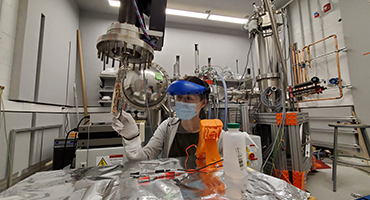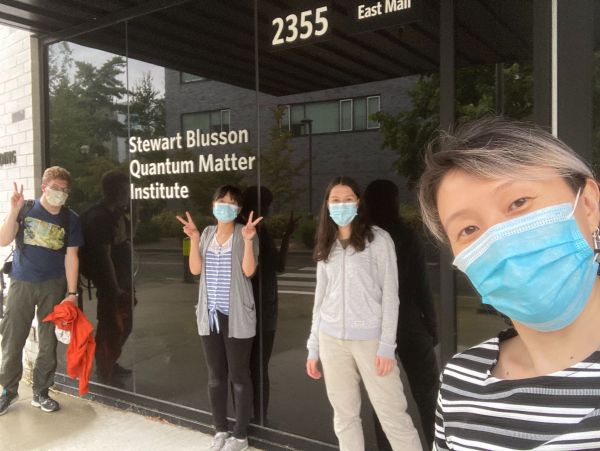FYSRE student Tiffany Matthé shares unique summer research experience

We recently reached out to second year physics student Tiffany Matthé about her summer research experience. Tiffany was the recipient of the Erich Vogt First Year Summer Research Experience (FYSRE) Award, and part of the Quantum Pathways Program at the UBC Stewart Blusson Quantum Matter Institute (SBQMI).
As one can imagine, her experience is rather unique. With COVID-19 restrictions, many things had to change.
"As we headed towards the summer, it became increasingly clear that at least part of the summer would require remote work due to COVID, and we discussed how we would tackle this unusual situation as a group," said Sarah Burke, Tiffany's supervisor and associate professor at UBC Physics & Astronomy. Sarah and her team focused on meaningful remote work for students - tasks ranging from design, analysis, to coding, and utilized online tools such as Slack and Zoom to maintain open lines of communication. Tiffany started by working on adapting code for analyzing electron spectroscopy measurements for one of the lab's new instruments with PhD student Amy Qu. Then, with Tiffany's design experience from first year undergraduate, she worked closely with Amy and Research Associate Jisun Kim on design projects to support the research team's involvement in one of SBQMI's Grant Challenges projects.
Here is what Tiffany thinks of her experience:
Has this experience change your mind about working (or not working) in Physics?
Working with the LAIR (Laboratory for Atomic Imaging Research) group was a fantastic experience where I was able to gain more exposure to physics in academia. I was excited to explore the world of physics research at the atomic scale, and what I learned has only fueled my curiosity for physics. Through my summer research, I realized that physics is far from simply observing the world; physics also helps us create new things that the world has never seen before. I found this amazing.
What were the new experiences you had that would not have been possible without FYSRE support?
Without FYSRE support, I would have missed out on the amazing opportunity of working in a physics lab right after my first year at UBC. There were so many cool experiences that would have not been possible, like working with ultra-high vacuum machines, writing MATLAB code to analyze photoemission spectroscopy data and improve Monte Carlo simulations, and learning more about physics. I was able to enjoy all of this with FYSRE's help and now have some amazing experiences and a new set of skills that will stay with me forever.
Any most memorable moments?
Near the end of the summer, I had the opportunity to work in the lab and was able to experience being in an acoustic isolation pod for the first time. It was an exciting and an eerily-quiet moment. I also got to see how [liquid] nitrogen ice cream was made and enjoyed eating it too!
How would you describe your "remote research" experience?
Although working remotely can have its challenges, I was given a lot of support and projects to work on, so I had a lot of fun analyzing data and learning about physics at home. There were many online meetings where I was able to connect with the researchers, learn about what they work on, and get help when needed.
The Erich Vogt First Year Summer Research Experience (FYSRE) offers research opportunities to budding academic stars after their First Year Physics courses. Selected students work in either a UBC Physics & Astronomy or a TRIUMF laboratory, under the supervision of a UBC/TRIUMF researcher. Deadline for 2021 applications is on January 31st, 2021.

Tiffany Matthé (Undergraduate in Engineering), Jisun Kim (Research Associate in QMI).